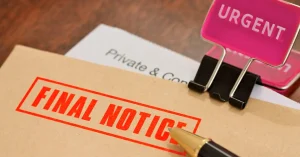Key takeaways:
- IRS civil penalties are fees issued because of civil offenses, like failing to file your tax return on time or failing to pay the tax you owe
- Six common civil penalties include:
- Penalty for underpayment of estimated tax
- Failure to file/late filing penalty
- Failure to pay/late payment penalty
- Accuracy-related penalty
- Tax fraud penalty
- Trust fund recovery penalty
- How to avoid IRS civil penalties:
- File taxes on time
- Pay taxes as soon as possible
- Figure out if you have to pay estimated tax
- Don’t underpay estimated tax
- Request a payment plan if you can’t pay
- Apply for first-time penalty abatement
- Pursue other forms of penalty relief
- Work with a tax professional
Filing tax returns and paying taxes is just part of being an American. It’s a legal requirement to report income and pay taxes on it, and the IRS takes necessary action when someone is late, fails to pay, includes false information, or makes some other illegal move or mistake.
Taxpayers are usually not in legal trouble if they make a mistake, especially if it’s their first time doing something wrong. The IRS instead issues penalties. The amount of the penalty depends on the offense and how serious it is. The agency issues both civil and criminal penalties, each with different implications.
This guide covers everything you need to know about civil penalties, including the most common civil penalties IRS agents issue, how they work, and ways to avoid getting a civil penalty.
What Are IRS Civil Penalties?
Civil penalties are more common than criminal penalties. Criminal tax penalties are related to criminal acts like tax fraud and tax evasion. Civil tax penalties are for less serious offenses, like failing to pay or file taxes on time. Sometimes criminal charges will lead to both criminal and civil fines, in addition to potential jail time. Most tax mistakes aren’t serious from a legal standpoint and just require a civil penalty IRS fee. No jail time is associated with civil mistakes.
The most common civil penalties are for filing late or paying taxes late. For example, if you miss the April 15 filing deadline one year, you’ll likely be charged a failure-to-file penalty. The failure-to-file penalty usually equals 5% for each month a taxpayer is past the deadline, up to five months. After five months, the penalty increases up to 25% per month. There is an additional 1% late charge for each of these months as well, and interest continues to accrue until the balance is paid.
Receiving a civil penalty from the IRS does not mean you’re in legal trouble. You just need to pay what you owe and pay the fees that have accrued. Make sure to pay close attention to any instructions the IRS gives you, and follow them accordingly. Your goal should be to put yourself in good standing with the IRS as soon as possible to avoid additional penalties.
Six Most Common Small Business Civil Tax Penalties
Operating a small business can be just as complex as running a large corporation; it can also come with similar tax complications. Six of the most common small business civil tax penalties are:
1. Penalty for Underpayment of Estimated Tax
The IRS will charge a penalty if you do not pay at least 90% of your tax liability. The IRS is picky with how they would like these payments to be made. You need to pay equal installments and the IRS still may charge a penalty if less is paid early and more is paid later. You will not be penalized if you pay at least 100% (110% if you make over $150,000) of your prior year’s tax bill in equal quarterly installments.
2. Failure to File/Late Filing Penalty
You will be charged with this penalty if taxes are owed and you do not file your tax return by the due date. You could face a 5% monthly penalty with a maximum of 25%.
3. Failure to Pay/Late Payment Penalty
You will be penalized 0.5% monthly on the outstanding tax balance if you fail to pay. This penalty can be reduced to 0.25% a month if you enter an installment agreement to pay back the taxes owed.
4. Accuracy-Related Penalty
Mistakes happen, but you may be charged a 20% penalty if the IRS finds you made errors on your tax return due to negligence or a substantial understatement of the taxes owed. This penalty can only be charged after an audit in which you can’t prove tax deductions taken or you failed to report all income.
5. Tax Fraud Penalty
You do not want to get charged with this penalty. You will be charged 75% if the IRS can prove you underreported your income or filed with the intent to be fraudulent. This penalty can be avoided by filing your taxes as accurately and honestly as possible. Note that there are both civil and criminal tax fraud penalties.
6. Trust Fund Recovery Penalty
A business must withhold and pay trust fund taxes if it has employees. These taxes include income tax, FICA, and the federal unemployment tax. A small company with employees must withhold the former two from each employee’s paycheck and send it to the IRS monthly.
The IRS issues these civil penalties when you make a mistake, but they won’t normally lead to any kind of criminal charge. Some of these penalties are very costly, especially if you have a big tax liability. Talk to a tax attorney right away if you have questions about a tax mistake or penalty.
Eight Ways to Avoid Civil Tax Penalties
You should try to avoid IRS penalties of any kind. They only get worse the longer you wait. Make sure you take these steps to avoid civil penalties:
1. File Your Taxes on Time Each Year
Taxpayers need to file their tax returns every year, usually by April 15, but it depends on where that date lands on the calendar. (The tax deadline is April 18 for 2023, for example.) Make sure you put this date on your radar each year.
You may also have to pay quarterly estimated taxes, which means you’ll have to pay the tax you owe in installments, usually on April 15, June 15, Sept. 15, and Jan. 15. Failing to file or pay by these dates means you will likely hear from the IRS about a civil penalty. Sometimes, like in the case of COVID-19, the IRS will extend tax deadlines to accommodate financial uncertainty or hardship. Pay attention to news about the IRS and deadlines each year.
2. Pay Taxes as Soon as Possible
You may file your tax return on time, but don’t forget that you need to pay the IRS by that April date, too. This is true even if you request an extension to submit your tax return in October. You still must pay the taxes by the April deadline.
3. Figure Out if You Have to Pay Estimated Tax
Some people don’t realize they have to pay quarterly taxes until they get a notice in the mail from the IRS with a fee. Figure out if you’re required to pay estimated taxes. The IRS states that these taxpayers need to pay estimated quarterly tax:
- Individuals, including sole proprietors, partners, and S corporation stakeholders, if they expect to owe at least $1,000 in tax for the year.
- Corporations that expect to owe $500 or more for the year.
Taxpayers who receive a regular salary or wages don’t have to pay estimated tax because their employer withholds tax from their earnings each pay period.
4. Don’t Underpay Your Estimated Taxes
It’s not always easy to know how much estimated tax to pay quarterly since your income could change from year to year. You can use Form 1040-ES to figure out estimated tax, which requires knowing your expected income, taxable income, taxes, deductions, and credits. You won’t get the underpayment of estimated tax penalty if you pay 100% of the tax on your tax return for the prior year or if you pay at least 90% of the tax for the current year, whichever is smaller.
5. Request a Payment Plan if You Can’t Pay
You can avoid some IRS penalties if you set up a payment installment plan when you’re not able to pay the full amount of what you owe at one time. The IRS will work out an agreement with you where you pay a monthly amount for a specific period.
6. Apply for First-Time Penalty Abatement
You may qualify for first-time penalty abatement if you make a mistake and it’s your first offense. This program was created in 2001 by the IRS to reward taxpayers who are normally compliant. You can call the IRS to make the abatement request or fill out Form 843 and send it in.
7. Pursue Other Forms of Penalty Relief
Sometimes the IRS will waive fees via other forms of penalty relief. You have to do one of the following for this to happen:
- Prove the error you made was the result of following the IRS’s guidance
- Show that you qualify for a statutory exception
- Prove you qualify for reasonable cause relief
Statutory exceptions can happen if you lived in a federal disaster area or were in the military in a combat zone. Reasonable causes could be when you did everything you could to file on time but a natural disaster, death, or filing system error made it impossible, among other reasons.
8. Work With a Tax Professional for Complicated Matters
These tax laws and requirements are complex. It’s not always easy to know how to respond to a notice or what your responsibilities are. This can especially be true for new or growing businesses. Talk to a tax expert when you’re not sure what to do. You need someone to look at your situation and finances and guide you on best practices and tax laws to follow.
Avoiding IRS civil penalties doesn’t have to be challenging. You never want to get into trouble with the IRS, so follow these steps each year and pay attention to changing tax law.
Other Best Practices to Stay in Good Standing With the IRS
Many people fear the IRS and hate paying taxes, but filing on time each year, paying what you owe, and being transparent will help you avoid problems. Here are some other tips for staying in good standing with the IRS:
- Inform the IRS anytime you’re unable to pay, and they may work with you through a payment plan or other method. Never try to hide anything or provide false information. Be honest. Otherwise, you will likely face more penalties or charges.
- Double-check your calculations every time. Many penalties or unnecessary correspondence come from simple math mistakes.
- Don’t automatically pay a penalty you don’t understand. The IRS could have made a mistake or you could qualify for penalty relief. Talk to a tax expert if you’re unsure why you received a civil penalty.
- Consider paying off your tax debt by borrowing money if you can’t pay. You’ll be in a better financial situation if you have a modest loan interest payment versus getting more civil penalties, interest, and fees from the IRS.
Remember that part of your responsibility as a taxpayer is to follow all applicable tax laws. Make sure you understand new tax requirements that may apply if you recently had a change in income, started a business, or changed your business’s structure.
Contact Silver Tax Group With Questions About IRS Civil Penalties
The team at Silver Tax Group is ready to help you deal with a civil penalty IRS issue. Talk to us as soon as you realize you made a mistake, didn’t pay your tax bill, or receive a notice from the IRS. Our team will guide you through what to do next. We also provide services related to tax fraud issues, tax debt resolution, emergency tax, and general tax consulting. Reach out to Silver Tax Group to speak to a tax expert about civil penalties.








